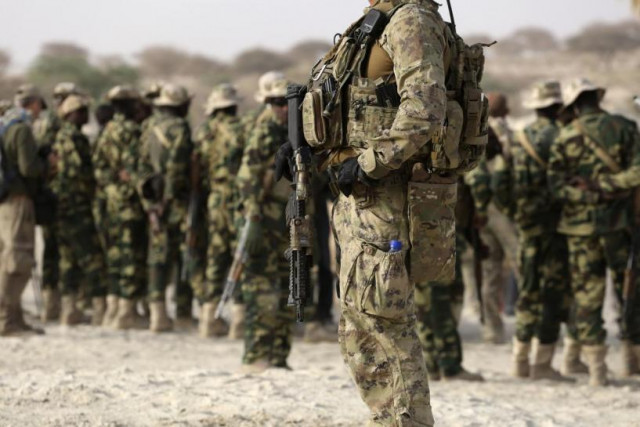Limits of American power
But Trump remains oblivious to these limits of US power

The US military. PHOTO:REUTERS
Today under President Trump, the same imperial hubris and sanctimonious arrogance drives American policies with even greater potential for disaster. His national security strategy not only targets the so-called Islamic terrorism but adds China, Russia, North Korea and Iran to the list of enemies while committing even more troops and resources to a futile war without end in Afghanistan, apart from embarking on a costly military buildup. Meanwhile, the American economy sinks deeper into debt worth trillions.
Trump cronies term their security strategy ‘pragmatic realism’. It is anything but that. The reality is that the US is no longer the ‘sole superpower’ and the world is no longer unipolar. With the emergence of China as a global power and a resurgent Russia, the world has become multi-polar which the US cannot dominate any more. Simultaneous American provocations against China and Russia have only realigned these countries against the US. Americans simply cannot compete with both at the same time.
Moreover, Trump’s ‘America first’ policy and bullying of Nato allies has alienated countries like Germany, France and even the usually obsequious Britain, while Turkey is now moving closer to Russia, defying the alliance to procure Russian weapons. Japan, South Korea and Australia are also weighing their security options with the growing vulnerability and unreliability of the American security umbrella. The American empire seems to be crumbling.
Trump’s attempt to play the sectarian card against Iran by backing Saudi Arabia while also encouraging Israel to reverse Iranian ‘influence’ in the region will only lead to even greater violence in the Middle East. The civil wars in Yemen and Syria could spread and engulf the entire region. Moreover, Trump’s rejection of the Iran nuclear deal and Tehran’s allegations of American instigation of civil unrest in Iran, may well derail any attempt to contain nuclear proliferation as well as the spreading regional conflicts. In this environment, the IS terrorists will find ample ungoverned spaces to regroup and reassert themselves.
After 16 years of fighting in Afghanistan, the longest war in American history, Trump seems to have abandoned any attempt to find a negotiated exit. The introduction of more troops as well as the reported building of a military base in addition to the five existing ones, signals that the US has no intention of withdrawing from Afghanistan. Instead, it may want a permanent presence there to increase American pressure against Pakistan, China, Iran and Russia, adding to the turmoil in Afghanistan and further de-stabilising the region. This would be yet another example of imperial overreach, with eventually disastrous consequences for the US.
By far the most dangerous Trump policy today is to risk nuclear confrontation with North Korea. Using threats and insults is not a mature or realistic policy against a Pyongyang regime armed with nuclear weapons and missiles that can destroy American targets even on the US mainland. Demands for a rollback of North Korean strategic capabilities are also futile. The only option is to negotiate an agreement that prevents further escalation and stabilises the situation. Kim Jong-un has called America’s bluff. Trump needs to back down or risk Armageddon.
For the US to seek global ‘full-spectrum domination’ in a multipolar world beset by several challenges to the US security is a fool’s errand. Moreover, the cost of such hegemony cannot be met by a US confronted by inequality, inflation and debt which, according to Ron Paul, leader of the Conservative Tea Party, has “brought America to the verge of collapse.” With GDP growth at 2.5% compared to China’s growth of 6.8% in 2017, the US simply cannot fund its global agenda.
A clear indicator of American global standing was the recent vote in the UN on the shifting of the US embassy to Jerusalem where the US was isolated in the Security Council and, despite its pressure tactics, received only nine votes, mostly from micro states, in the General Assembly.
But Trump remains oblivious to these limits of US power. He swaggers about offending friends and foes alike. The latest is Trump’s petulant tweet about Pakistan. Suspending aid, which for the most part is really reimbursement for Pakistan’s expenditure on counter-terrorism efforts (Coalition Support Fund), is meaningless because now Pakistan has other options. Trump also forgets that without Pakistan’s cooperation, his campaign in Afghanistan will collapse. Instead of using Pakistan as a scapegoat for their failure in Afghanistan, the Americans need to evolve a cooperative relationship consistent with Pakistan’s security interests. Islamabad has wisely chosen to treat Trump’s tweet with the contempt that it deserves and focus on its own efforts to combat Indo-Afghan sponsored terrorism with American connivance. We should continue to be guided by the wise Arabic proverb: “The dogs bark but the caravan moves on.”
Published in The Express Tribune, January 5th, 2018.
Like Opinion & Editorial on Facebook, follow @ETOpEd on Twitter to receive all updates on all our daily pieces.














COMMENTS
Comments are moderated and generally will be posted if they are on-topic and not abusive.
For more information, please see our Comments FAQ